The Lancaster Vegetable Farmers Cooperative was started as a place where growers could dry, sort, grade, and package onions and winter squash.
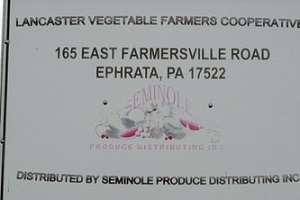
It also serves as a cold storage area for cauliflower. We were there to see the onion grading. Onions brought to the Cooperative are grown following production practices developed for the Pennsylvania Simply Sweet Onion program. These are certain cultivars of sweet Spanish onions grown using a plasticulture system with raised beds, black plastic, and drip irrigation.
More information about the Simply Sweet Onion program.
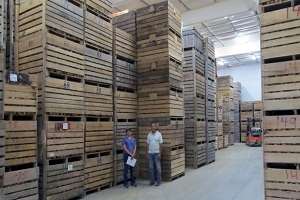
Onion bins stacked to ceiling waiting to be graded and packed. Photo: Bill Lamont
About 80 growers producing about 140 acres of onions belong to the Cooperative. The amount of acreage in onions varies by grower with the smallest being about ½ acre which yields about 15 bins of onions.
Onions are dried, sorted, graded, and packaged starting about the 1st of July and ending around the 10th of September. This year the start was July 11th and onions will run until about the 1st of October. If this sounds like an early start to the onion harvest season, you are right. Bacterial problems of onions are more severe in the southeastern area of Pennsylvania and so onions are harvested early.
The drying room can hold 900 bins, each holding about 1000 pounds of onions, at a time. Bins are stacked and covered with a tarp. Air is forced through the onion bins and out of the drying room. Once onions are dried, they are stored in a cold room until they are sorted, graded, and packaged.
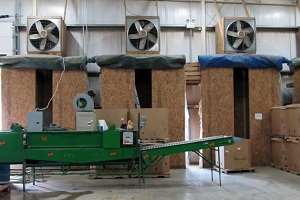
Bins of onions are stacked below each fan. The tarp is rolled out over the bins before the fans are turn on.
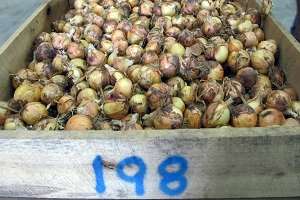
A bin of onions dried and ready for grading and sorting. The bin has the grower’s number on it.
Onions only from one grower are run at a given time. Growers pay for the labor used on the packing line. They either bring labor from their farm, use the labor at the Cooperative or a combination of both. When we were there the farmer had brought 8 of his employees and was using another 8 or so Cooperative employees.
A bin of onions is loaded onto a conveyor belt where a worker will immediately sort out obviously unmarketable onions. Then, they move through a sorter through where onions that are less than 2.5 inches in diameter are culled out. The remaining onions move to a carrousel surrounded by workers who inspect every onion for quality. They are examining for rots by feeling for moisture and looking for black coloring in the necks. They also look for any other defects and remove some of the outer leaves. Unmarketable onions are sent down one conveyor belt to be discarded and marketable ones are placed in an opening at the center of the carousel for further sorting.
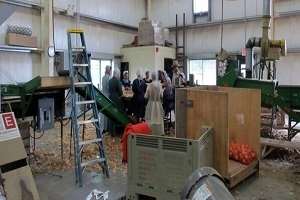
Workers around the carrousel evaluating each onion.
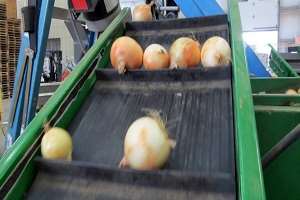
Onions moving on a conveyor belt.
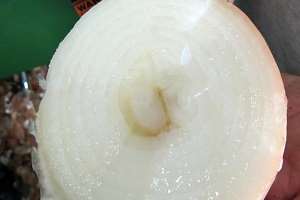
Internal bulb rot is not easily apparent from the external appearance. Workers look for black coloring on the neck as an indicator.
Good onions move through a series of sizing sorters and are categorized into small (2.5 to 3 inch diameters) through colossal (over 4 inch diameter) grades. Three pounds of small onions are placed into a mesh bag. All of the other sized onions individually receive a Pennsylvania Simply Sweet sticker and are packed in boxes according to size, to a weight of 40 lbs. Once packaged, onions go to a finish room until they are sold.
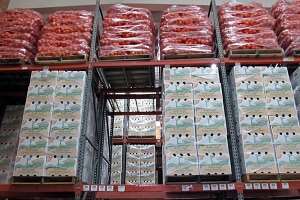
Boxes and bags of onions in the finish room ready for shipping.
The Cooperative facility undergoes the Harmonized GAP with a Walmart Addendum food safety audit. Traceability is important. Each bin is labeled with a grower identification number. Bar codes and stickers including the date of pack and grower identification number are placed on all packaging.
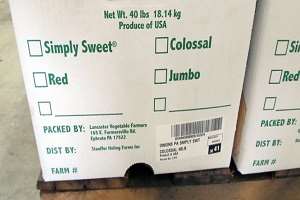
Box of onions showing bar code in the lower right of the photo.
While the processing line for butternut squash as not running while we were there, we did see the equipment and the finished product. Bins of squash were waiting to be shipped to a processing facility.
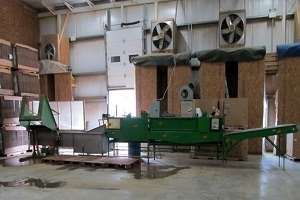
Butternut squash cleaning and sorting line.
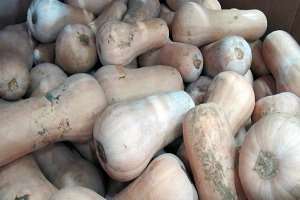
A bin of butternut squash ready to be shipped to a processor.
Source: psu.edu